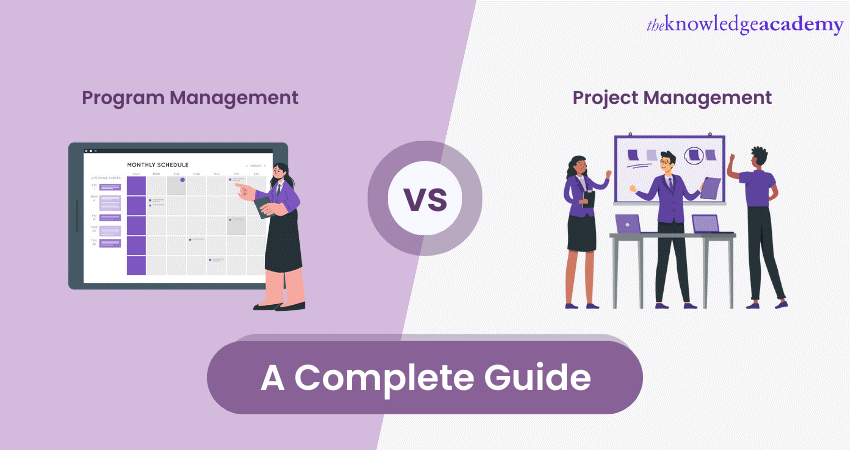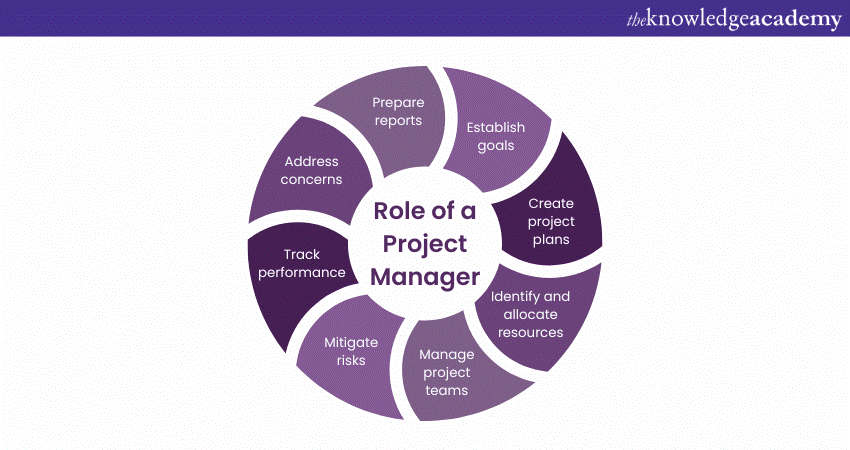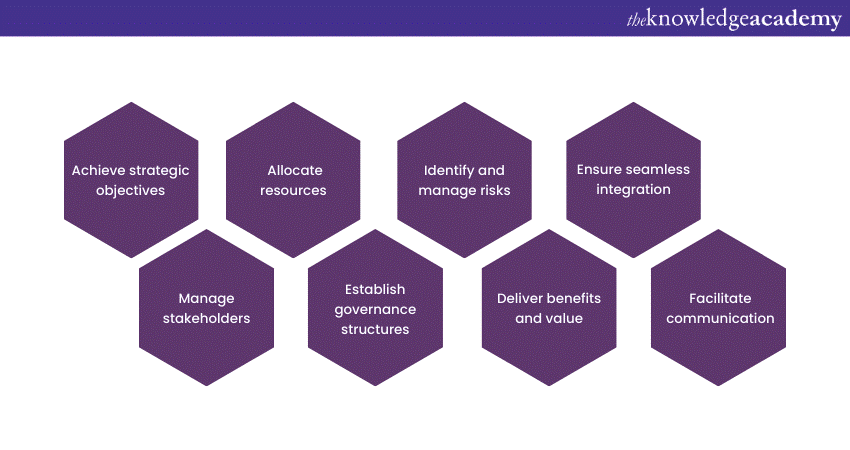We may not have the course you’re looking for. If you enquire or give us a call on +39 800580270 and speak to our training experts, we may still be able to help with your training requirements.
Training Outcomes Within Your Budget!
We ensure quality, budget-alignment, and timely delivery by our expert instructors.

Confused between Program Management vs. Project Management? Then, you are not alone! Lots of professionals out there are having trouble figuring out what makes them unique. Therefore, in order to help you, we are here to make the issue a little bit simpler. In this blog, you will find out that two different fields of study have different roles and principles.
Program Management and Project Management are two key disciplines that admittedly play a crucial role in the growth of an organisation. With staggering complexity of business landscapes and implementation of strategic goals, the leaders of the companies need to learn to distinguish and look at the fundamental hurdles between them. According to PayScale, the typical remuneration for a Project Management Professional in UK is valued at 57,000 GBP annually. Read the blog further to learn everything about Program Management vs. Project Management.
Table of Contents
1) What is Program Management?
2) What is Project Management?
3) Program Management vs. Project Management: Key differences
4) The Role of Project Managers
5) The Role of Program Managers
6) Conclusion
What is Program Management?
Program Management could be described as coordinated management of a portfolio that consists of projects, activities, and initiatives that are interrelated and strategically synched. Its purpose is to fulfil the organisation's strategic goals by managing group
of related projects in coordinated manner.
What is Project Management?
Project Management encompasses competent execution of plans and actions employing knowledge, skills, techniques, and tools to help attain certain project goals under defined constraints. These project operations are the way in which a unique product, service or outcome is achieved.
Take your Project Management expertise to the next level with our Program Management Professional (PgMP)® Training. Sign up now!
Program Management vs. Project Management: Key differences
Although both positions are involved in organising processes to attain company goals, they differ in some important ways. Given below are the differences between Program Management vs. Project Management:
Scope and duration
Program Management is a process of managing numerous programs or initiatives that you can coordinate or combine with the objectives of the organisation. This may be in the form of the long and unfixed periods of action without definite end-date regularity.
However, Project Management is concentrated on the effective completion of a particular project with specified boundaries. It includes scope, time, and resources. Projects have a distinct beginning and end.
Objectives
Program Management aims at achieving strategic objectives by aligning and coordinating multiple projects or activities. The main objective is ensuring that everything that the company does meets the organisational objectives and add value directly to the organisation. However, Project Management is largely aimed at delivering particular outputs and results which are within the boundary of time, budget, and range.
Complexity
When comparing Program Management and Project Management, a key difference lies in the complexity level involved with each discipline. Program Management deals with higher levels of complexity compared to Project Management. This is primarily due to the nature of programs, which typically involve multiple projects or activities that are interconnected and interdependent. These projects within a program often have complex relationships and dependencies, requiring a holistic and strategic approach to manage them effectively.
In Program Management, the Program Manager navigates and addresses various complexities, such as managing stakeholder expectations across different projects. They facilitate resources and budgets fulfillment across the program, and they ensure the alignment with the corporate strategic plans. Moreover, these programs include larger numbers of participants having unrelated preferences and agendas, giving rise to the complicated situation.
While a Project Manager needs to guide others and manage the project within an confined program, the issue of complexity is usually paramount for them. Project Managers have to ensure the completion of deliverables within the specified time constraints and the allocated budget. They work closely with project team and stakeholders to make sure projects deliverables are achieved on time, and potential problems such as risks or issues are addressed foreseeably and judiciously.
Stakeholder Management
Program Managers are more accountable for handling stakeholders on organisation level. In order to enhance the program success, they must get and onto page the executives, CEOs, sponsors, Project Managers, and team members . In contrast, Project Managers deal with the management of stakeholders, based on the scope of the project they are working in.
Risk Management
Program Management involves managing risks at a strategic level, considering the potential impact on multiple projects and the overall program objectives. Project Management primarily focuses on identifying, assessing, and mitigating risks specific to the individual project.
Learn Risk Management with our PMI-RMP® Certification Training and become an invaluable asset – sign up now!
Resource allocation
Program Managers allocate resources across multiple projects to ensure optimal utilisation and alignment with program objectives. They consider the needs of each project within the program and allocate resources accordingly to achieve the desired program outcome.
In Project Management, managers focus on allocating resources within the boundaries of the specific project. They ensure that the necessary resources, such as personnel, budget, and materials, are available and effectively utilised to accomplish project deliverables.
Program Management involves resource allocation at a higher level, considering the needs of multiple projects within a program. Project Management focuses on resource allocation specific to individual projects, ensuring resource availability and efficient use to achieve project goals.
Change Management
Change Management is an important aspect that differs between Program Management and Project Management. In Program Management, managing a change is complex and broad. Programs experience significant changes due to strategic shifts or market conditions. Program Managers mitigate disruptions, ensuring alignment with organisational objectives and smooth transitions.
In Project Management, change management is project-focused. Project Managers handle changes within the defined scope, considering their impact on timelines, budgets, and resources. They assess feasibility, involve stakeholders, and implement changes through change control procedures.
Performance measurement
Program Management is responsible for monitoring both the Project and Program levels through Program Management Performance. Program Managers monitor the performance of every specific project in the program as well as the overall program's progress towards attaining the goals and objectives set forth. On the contrary, Project Management is majorly concerned with assessing the project performance and whether it would meet the defined goals and objectives.
Governance
Governance is one of few elements in both Program Management and Project Management, but the disparity is in the way governance is put to action in both the areas. In Program Management, governance structures and processes are formed to guarantee intelligent decision-making and control over the multiplicity of projects within the program.
Program governance serves as a ladder that specifically divides the roles and duties of the program and its stakeholders. It will establish infrastructures for providing strategic direction, performance regulation including at project and program levels. The governance framework of the program ensures that it remains in line with the primary strategic objectives of the organisation and all the projects in the program are coordinated and well-managed.
On the other hand, Project Governance is underlining process that deals specifically with project decisions and control systems. It describes the responsibilities and duties of Project Manager, team members and other persons involved in the project.
The framework of the project governance assists in keeping the project on course, carrying out according to the accepted scope, schedule, and budget. It can be expressed as accomplishing several tasks in response to the identified risks, concerns, and communications exchanged with project participants. The project governance framework ensures project management by holding it to the desired outcomes within the set constraints.
Strategic alignment
Program Management skills is closely aligned with the organisation's strategic objectives. Programs are designed to contribute to the achievement of strategic goals and outcomes. Project Management, while supporting organisational objectives, is more focused on delivering specific project outcomes rather than broader strategic alignment.
Accelerate your Project Management career with our PMP® Certification Training – sign up now!
The role of a Project Manager
A Project Managers role contains different responsibilities to make projects complete effectively towards the set goals. Here are some key aspects of a Project Manager's role:

a) Defining project goals and objectives: Project Managers work closely with stakeholders to define clear and achievable goals aligned with the organisation's strategic objectives.
b) Developing project plans and schedules: Project Managers create comprehensive plans outlining tasks, resources, and timelines for timely completion.
c) Resource allocation: Project Managers identify and allocate essential resources, including human resources and materials, to support project execution.
d) Team management: They assemble project teams, assign roles and responsibilities, and promote collaboration and effective communication.
e) Risk management: They identify and mitigate potential risks to ensure a project’s success.
f) Monitoring and controlling: Project Managers monitor project progress, track performance, and make necessary adjustments to keep the project on track.
g) Stakeholder communication: They facilitate stakeholder communication to provide updates, address concerns, and manage expectations.
h) Reporting and documentation: Project Managers prepare reports and maintain project documentation for reference and knowledge transfer.
Project Managers play an integral role in defining goals, developing plans, managing resources and teams, mitigating risks, monitoring progress, and ensuring successful project outcomes.
Understand the work breakdown structure used in project management with our comprehensive CAPM® Certification Training.
The role of a Program Manager
Program Managers are in a strong position to co-ordinate and supervise different activities or projects which form an integral part of an organisational set up. Here are some key aspects of a Program Manager's role:

a) Strategic alignment: Program Managers ensure that programs align with the organisation's strategic objectives.
b) Stakeholder management: They engage and manage stakeholders at various levels, fostering collaboration and addressing concerns.
c) Resource allocation: Program Managers strategically allocate resources across multiple projects within the program.
d) Program governance: Program Managers establish governance structures and processes for effective program management.
e) Risk management: Program Managers identify and manage risks at a program level, developing mitigation strategies.
f) Benefits realisation: Program Managers focus on delivering benefits and value through successful project execution.
g) Program integration: Program Managers ensure seamless integration and coordination among different projects.
h) Communication and reporting: Program Managers facilitate communication and provide regular updates to stakeholders.
Program Managers play a vital role in strategic alignment, stakeholder management, resource allocation, program governance, risk management, benefits realisation, program integration, and effective communication.
Enhance your agile skills with our PMI-ACP® Certification Training course - join now!
Conclusion
We hope you read and understood everything about Program Management vs Project Management. They both differ in scope, objectives, complexity, resource allocation, and change management. Understanding these distinctions helps organisations effectively manage their initiatives, optimise resource utilisation, and align projects with strategic goals for successful outcomes.
Unlock your Project Management potential with our industry-leading PMP Training - sign up now!
Frequently Asked Questions

Program Management fosters innovation by aligning multiple projects towards strategic goals. They ensure resources are utilised efficiently, foster collaboration, identify opportunities, and optimise processes, driving a culture of innovation within organisations.

Project Managers encounter challenges such as resource constraints, stakeholder alignment, and managing scope changes while driving business development initiatives. Balancing these factors is crucial for project success.

The Knowledge Academy takes global learning to new heights, offering over 30,000 online courses across 490+ locations in 220 countries. This expansive reach ensures accessibility and convenience for learners worldwide.
Alongside our diverse Online Course Catalogue, encompassing 17 major categories, we go the extra mile by providing a plethora of free educational Online Resources like News updates, Blogs, videos, webinars, and interview questions. Tailoring learning experiences further, professionals can maximise value with customisable Course Bundles of TKA.

The Knowledge Academy’s Knowledge Pass, a prepaid voucher, adds another layer of flexibility, allowing course bookings over a 12-month period. Join us on a journey where education knows no bounds.

The Knowledge Academy offers various Project Management Courses, including Introduction to Project Management Certification Course and Project Management Masterclass. These courses cater to different skill levels, providing comprehensive insights into Project Management.
Our Project Management Blogs cover a range of topics related to Project Management Skills, offering valuable resources, best practices, and industry insights. Whether you are a beginner or looking to advance your skills in Project Management, The Knowledge Academy's diverse courses and informative blogs have you covered.
Upcoming Project Management Resources Batches & Dates
Date
 PMP® Certification Training Course
PMP® Certification Training Course
Mon 6th Jan 2025
Mon 13th Jan 2025
Mon 20th Jan 2025
Mon 27th Jan 2025
Mon 3rd Feb 2025
Mon 10th Feb 2025
Mon 17th Feb 2025
Mon 24th Feb 2025
Mon 3rd Mar 2025
Mon 10th Mar 2025
Mon 17th Mar 2025
Mon 24th Mar 2025
Mon 31st Mar 2025
Mon 7th Apr 2025
Mon 14th Apr 2025
Tue 22nd Apr 2025
Mon 28th Apr 2025
Tue 6th May 2025
Mon 12th May 2025
Mon 19th May 2025
Tue 27th May 2025
Mon 2nd Jun 2025
Mon 9th Jun 2025
Mon 16th Jun 2025
Mon 23rd Jun 2025
Mon 30th Jun 2025
Mon 7th Jul 2025
Mon 14th Jul 2025
Mon 21st Jul 2025
Mon 28th Jul 2025
Mon 4th Aug 2025
Mon 11th Aug 2025
Mon 18th Aug 2025
Tue 26th Aug 2025
Mon 1st Sep 2025
Mon 8th Sep 2025
Mon 15th Sep 2025
Mon 22nd Sep 2025
Mon 29th Sep 2025
Mon 6th Oct 2025
Mon 13th Oct 2025
Mon 20th Oct 2025
Mon 27th Oct 2025
Mon 3rd Nov 2025
Mon 10th Nov 2025
Mon 17th Nov 2025
Mon 24th Nov 2025
Mon 1st Dec 2025
Mon 8th Dec 2025
Mon 15th Dec 2025







 Top Rated Course
Top Rated Course



 If you wish to make any changes to your course, please
If you wish to make any changes to your course, please


